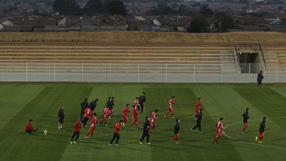
Just like the icy bluster of Port Elizabeth, the Group B encounter in South Africa's 'Windy City' could go either way for two teams capable of upsets but more likely to fast fizzle out given their dire World Cup campaigns of the past.
Greece's stunning Euro 2004 triumph and South Korea's march to the World Cup semi-finals on home soil in 2002 are fading memories and both countries face a Herculean task of getting out of a group that includes African giants Nigeria and one of the tournament favourites, Argentina.
While Saturday's game in the sleepy beach city is far from a mouthwatering match, three points for Greece or Korea could prove decisive and complicate their higher-ranked opponents' assumed passage to the second round.
A Greece win would also help exorcise the ghosts of a woeful World Cup past that features three games and three defeats without a single goal scored in their only appearance in 1994.
Ageing coach Otto Rehhagel believes the past should be forgotten, except for Euro 2004 from which he has retained six players in a squad he stressed was not here for a holiday.
INFERIORITY COMPLEX
The German is expected to opt again for a team strong in defence and heavily reliant on lone striker Fanis Gekas to provide the eye-popping firepower that made him top scorer in European qualification with 10 goals from 12 games.
The best features, fun and footballing quizzes, straight to your inbox every week.
South Korea's World Cup record is more impressive as they have reached the last seven finals and cruised unbeaten through qualification, although their failure to reach the second round on foreign soil underlines an inferiority complex outside the comfort zone of the fledgling Asian game.
Saturday's match brings the inauguration of the eye-catching Nelson Mandela Bay Stadium but could play host to a stalemate, with Korea's slick and relentless counter-attacking likely to be stifled by Greece's unyielding defence and 4-5-1 formation.
But what they lack in size, the Koreans make up for in the fitness and industriousness exemplified by captain Park Ji-sung, nicknamed "Three-lunged Park" for his astounding stamina.
In Huh Jung-moo, Korea have a local coach for the first time since the 1998 finals and have six players from European clubs in their biggest foreign-based contingent at the finals which Park believes could help break their World Cup hoodoo.
"The experience helps the younger players to be more confident to play at the World Cup," he said this week.
"But it's not an easy group. We have to fight... but I think we have a chance to get through the group stage."
 Join The Club
Join The Club





